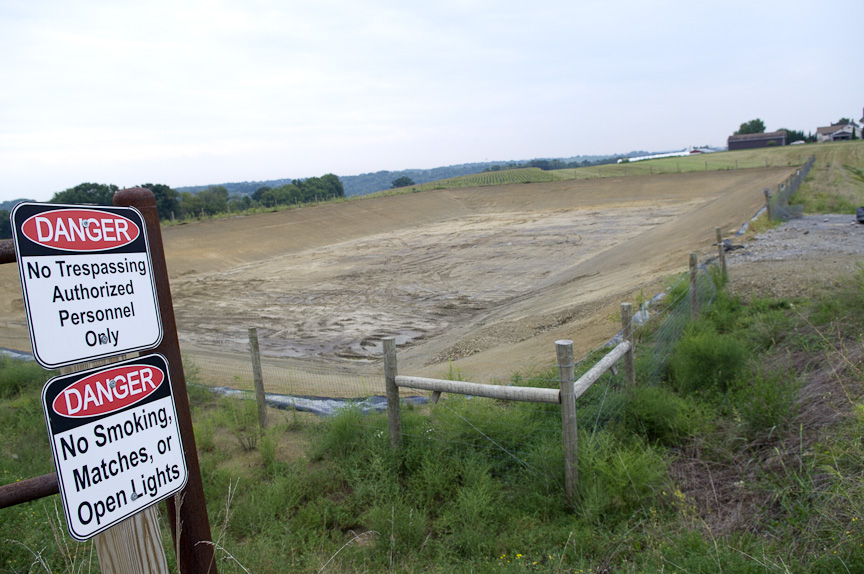
A few weeks ago I went to Linda and David Headley's farm in Smithville, Pennsylvania to talk about what it's like to live next door to natural gas drilling. The Headley's house was packed with people who have drill pads and wastewater pits in their yards. They described seeing their tap water turn brown, smelling gasoline and kerosene in the air, and feeling their houses shake day and night when wells are fracked.
But their most pressing concern was what fracking was doing to their health. Many residents said they suffered migraines, dizziness, and asthma, and they believe the drill pads have something to do with it.
One woman showed a video of her young grandson who lay sleeping, but his whole body twitched. She said the boy had never experienced neurological problems until two wells and a large compressor station were installed near their home.
I am not a doctor or researcher. I do not know if all of these medical conditions are connected to natural gas development. But I do know that people need answers and more information about what fracking may be doing to their health.
The trouble is there isn't much information to share. While people have been concerned about fracking's impact on health and the environment for years, very few studies have been done.
 Photo credit: Melanie Blanding
Photo credit: Melanie Blanding
One of the biggest challenges is simply finding out what natural gas companies are pumping into the air and water. Fracking is exempt from many federal requirements to monitor air and water pollution, and gas companies don't do much voluntary reporting. In addition, most states do not ask energy companies to identify the fracking chemicals they pump into the earth or dump into wastewater pits sitting in people's backyards, and only six states call on companies to share that information with doctors and nurses treating patients living next to fracking operations. A new law in Pennsylvania requires health care professionals to sign a confidentiality agreement before companies divulge their fracking chemicals. If doctors pass that information to their patients, they could be sued.
Industry opposition and lax standards have limited the amount of data we have. But the data that do exist strongly suggests that fracking poses risks to public health and the environment.
There is significant evidence, for instance, that fracking operations release air pollutants linked to health problems. One study analyzed air pollution levels close to well sites during the fracking process. Researchers concluded that the types and levels of contaminants measured in the air could create an increased risk for respiratory illness, neurological conditions, and cancer.
Fracking can also contaminate water by introducing chemicals and stirring up naturally occurring toxic metals. NRDC reviewed water quality data from 25 families living next to fracking operations in five different states. We found 44 contaminants in the water -- including benzene, ethyl benzene, and arsenic, which are linked to elevated cancer risk. Most of the contaminants were found in levels below federal drinking water standards, but benzene exceeded the standard in 5 of 25 wells, the ethyl benzene in 3 of the wells, and arsenic in 1. Since these contaminants have multiple potential sources, however, without pre-drilling water monitoring we cannot know whether they were present in the water before fracking, and if so, at what levels...
These studies are a start, but we need more data and more analysis because we must prevent pollution that can harm human health and the environment. Communities have a right to know what they are exposed to and how best to protect themselves and their families.
I sensed a lot of fear in the communities I visited in Pennsylvania, and it reminded me of when I served on the National Commission on the BP Deepwater Horizon Oil Spill and Offshore Drilling, and people in Louisiana and Mississippi told me how scared they were for the health of their families. They knew they had been exposed to oil and to chemicals used in the dispersants, but they didn't know if that exposure would be harmful or how to keep their families safe.
Residents of Pennsylvania, Ohio, Colorado, North Dakota, and the 25 other fracking states have similar questions, and they deserve answers. In order to provide them, we need stronger federal and state standards to require mandatory disclosure of all chemicals used in fracking and increased air and water monitoring before and after fracking. Officials should also require and ensure companies prevent pollution in the first place.
We also need government agencies to fast-track more research. No one should have to live next to a frack pad when it might be impairing their health and the health of their loved ones.
This post originally appeared on NRDC's Switchboard blog.
